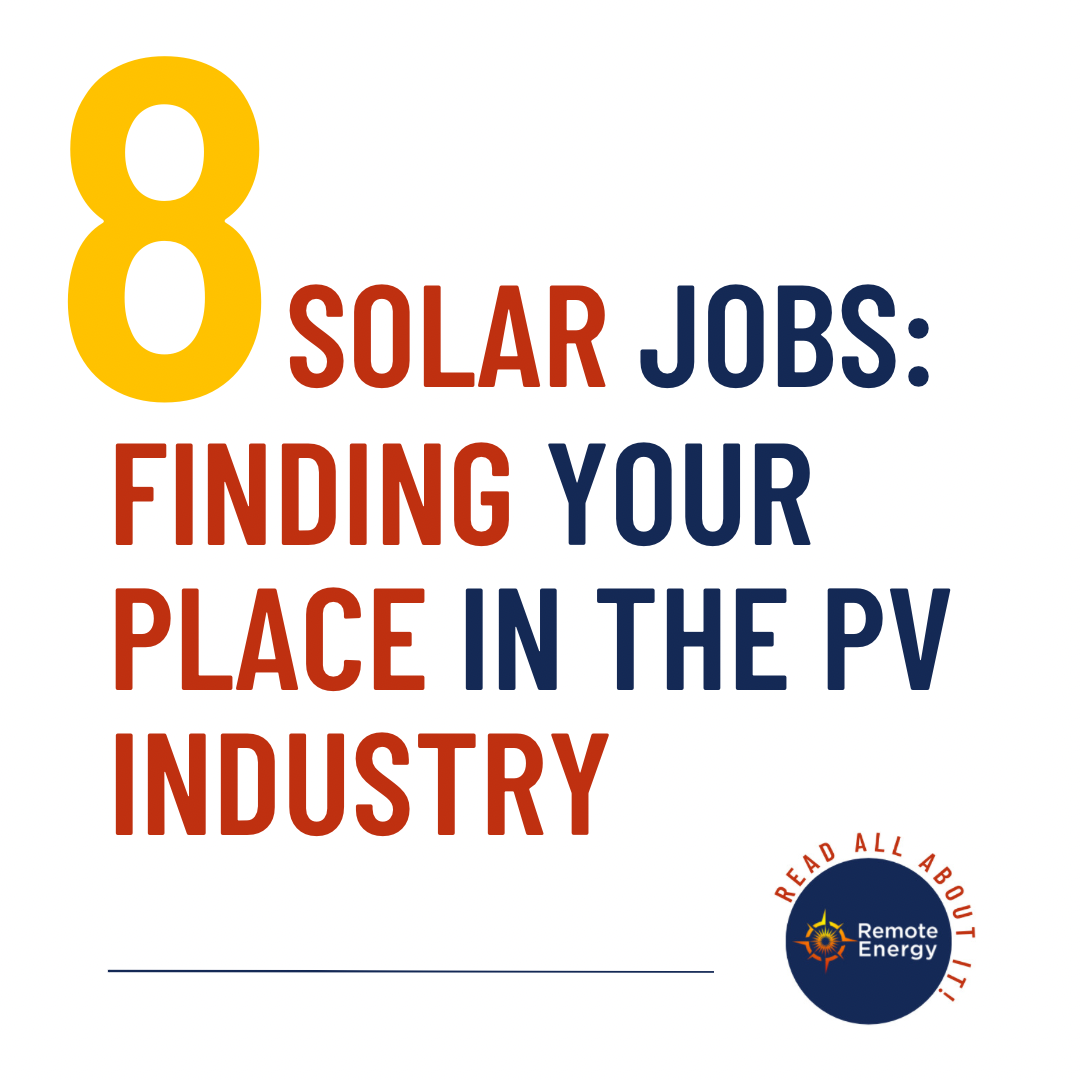Solar Jobs: Finding Your Place in the PV Industry
By now the news is old: The use of fossil fuels to generate electricity is unsustainable, expensive, and contributes to the warming of our planet while polluting the environment and damaging our health. The solution, and the future of energy on earth, has never been more evident. Clean, renewable, energy such as solar PV has emerged as the world’s cheapest new source of energy. It is available anywhere the sun shines, is non-polluting, robust, proven, and here to stay. It is no wonder that the solar energy industry has averaged a 50% growth rate every year for the past decade. This is all great news for the nearly 1 billion people who still lack access to reliable electricity. It’s also great news for those who seek jobs and opportunities in the renewable energy sector.
As solar energy grows exponentially, opportunities arise and millions of jobs are created. Employment in renewable energy worldwide was estimated at 12 million workers this year. In the off-grid solar market alone, the International Renewable Energy Agency (IRENA) reported that by 2030 there will be 4.5 million jobs – these workers will directly serve the rural communities that the utility grid has ignored or forgotten.
Jobs in the PV industry take on many forms as systems range in size from 1,000 MW (containing millions of solar panels) to under 100 W (containing 1 solar panel). There are opportunities for people with all types of skill sets. Regardless of where you fit in, anyone working in the PV industry should take the initiative to learn and understand the basics of PV systems. While solar energy technology is relatively elegant and simple, there’s a lot to learn. Some jobs are very specialized and may require extensive training, others allow for entry level positions and entrepreneurial opportunities. The following is a brief summary of what solar jobs there are and what it takes to get these jobs. Depending on the size of the business and the depth of your ambition, your job in the PV industry might encompass one or many of these positions.
Regardless of the system size, all PV installations take some degree of planning and preparation. Large-scale PV projects may include many teams of people to complete these tasks, while small installations may be developed, designed and installed all by the same person. Project developers typically have the task of developing and managing a PV project from start to finish. On large PV installations developers may work for big companies or utilities and typically have a background in project management or business. However, project developers can also be community members or anyone who has the ambition to organize a solar energy installation. Project developers dont necessarily need to know or understand all the technical aspects of a PV system.
Often, a solar consultant is hired to work independently and provide valuable advice regarding site selection, technology and equipment configuration. They may also have the expertise to provide information regarding sourcing of equipment, recommending installers and even advice regarding financing options. Solar consultants have access to a broad knowledge base and usually have experience with project development, and system design and installation. .
System designers are tasked with drafting the plans for the PV system and selecting and integrating the system components. Depending on the size and complexity of the system, this job may require high-level electrical engineering degrees or experience. For small simple systems, designers must at least have the technical training to understand the operating parameters and limitations of the system components, as well as an understanding of local electrical codes and practices. System designers require extensive technical training and must understand and follow the industry trends as well as the local electrical and building codes and regulations. Project developers, consultants and system designers may also provide direction and support during the installation process.
NEARLY HALF OF THE NEW JOBS IN THE PV INDUSTRY WILL GO TO SYSTEM TECHNICIANS AND PV INSTALLERS.
Solar System Technicians and PV Installers are the women and men who turn a system design on paper, into a fully operational system. These workers require the skills, strength, and training to safely assemble PV racking structures on the ground or on roofs, mount and wire solar panels, and connect all of the associated electrical components. Some system technicians and installers must also understand the function of each of the components and have the ability to program, operate, maintain, troubleshoot and repair PV systems.
Sometimes, especially on large-scale systems, there are Operations and Maintenance Technicians to perform these specialized tasks.
All PV installers require some level of specialized training, and those working directly with the electrical components may require special licenses and certifications. It is critical to research the requirements in your area and be proactive in your quest to be as knowledgeable and skilled as possible. Typically, people who have experience in the building trades (such as carpentry, electrical work, roofing, etc.) already have many of the skills required to install PV systems. Whereas some PV installation companies provide on-the-job training it is highly recommended that all PV installers successfully complete training programs that provide both theoretical knowledge and hands-on practice with an emphasis on job-site safety. .
Installation classes and training programs are available in-person and online through a number of solar manufacturers, solar training organizations such as Remote Energy, or through community colleges and trade schools. Training and education don’t stop once you get the job – it continues throughout your solar career. Beginners as well as seasoned professionals require continuing education to stay up to date with the newest technologies, products and best design and installation practices.
Not all solar jobs require a technical background. Like any other type of business, solar energy companies need people to perform marketing and sales work. This may include direct sales and marketing of PV systems to consumers, or the retail or wholesale sales of PV system components.
Salespeople who sell systems to consumers or end-users must be trained to survey properties and conduct feasibility studies to ensure the system will perform as expected. In many cases, solar sales people also help educate the consumer and the public about solar energy. To ensure the end-user has realistic expectations about their PV system, and to maintain high standards in the industry, it is important for installation companies and product resellers to provide accurate information to the public.
This is also the case for solar trainers and teachers. The men and women who train the workforce may have the most important job of all. They require both the technical skills and experience in the PV industry as well as the ‘soft’ skills needed to convey the information and inspire and motivate a workforce.
Finally, behind the scenes of the PV industry are all the jobs centered around the research and development and manufacturing of PV products and equipment. Men and women in a range of scientific fields perform research and development to improve solar energy technology by working to boost efficiency and reliability and lower product cost. Careers in solar energy research and development involve working in an office or laboratory, often in conjunction with a manufacturing facility. These jobs require high-level specialty training and education and typically attract chemists, physicists, and material scientists.
To learn more details about each solar job including a description, skills requirement, and education level, check out IREC’s Solar Career Map.
CLICK HERE to learn more about Remote Energy’s upcoming online PV training opportunities!










